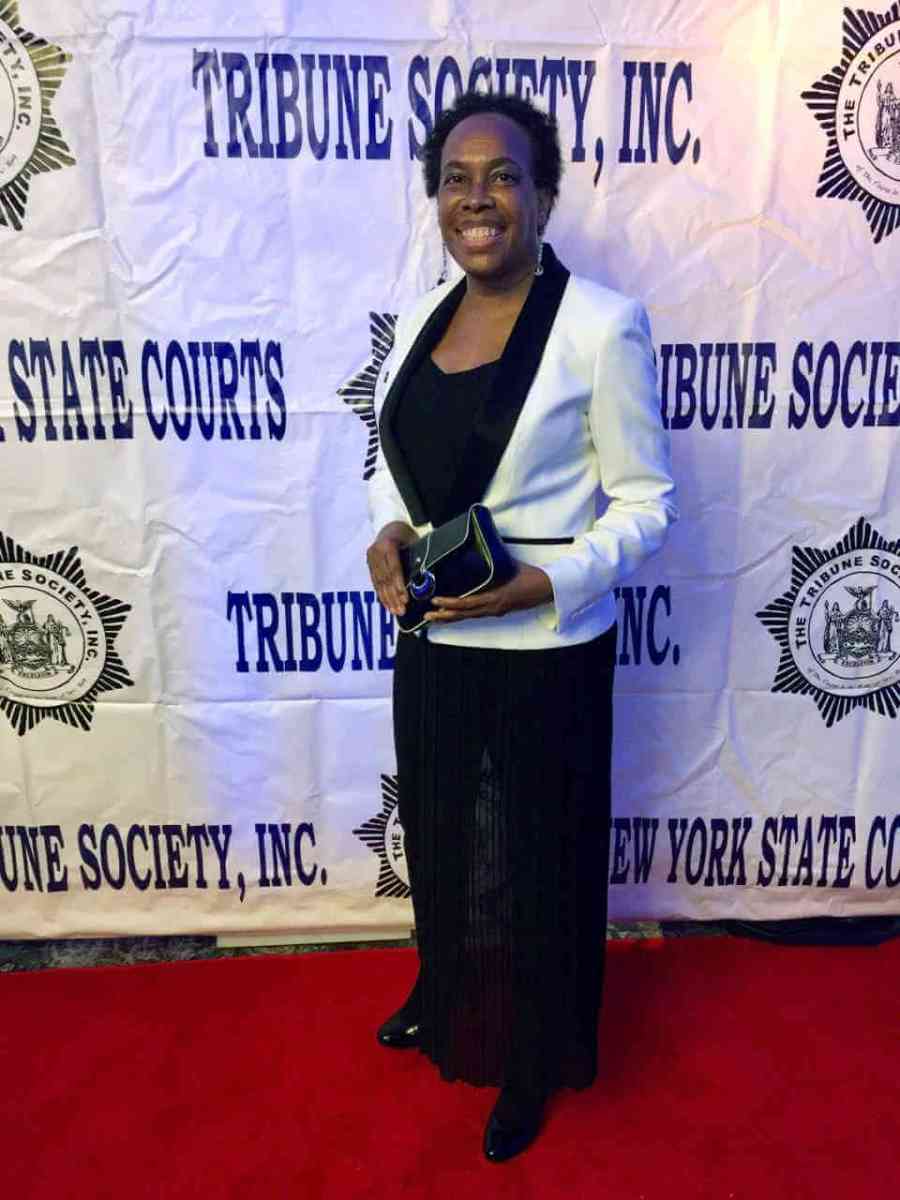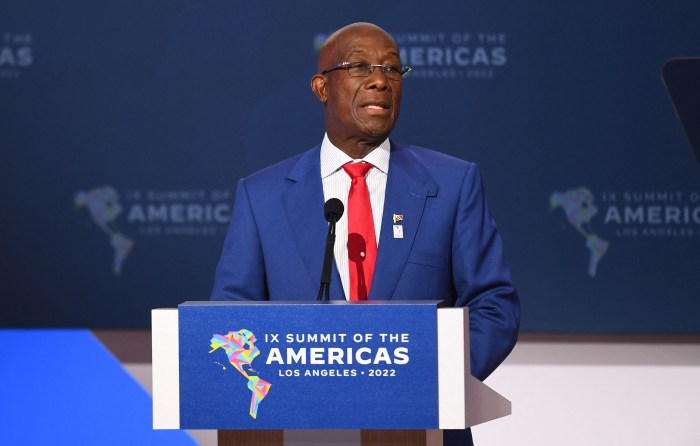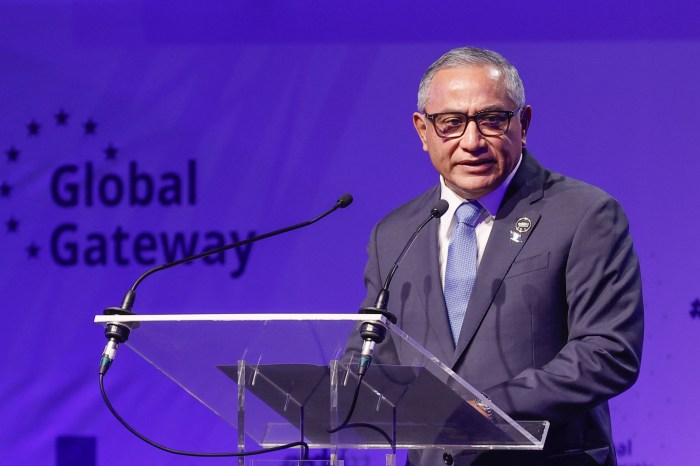Trinidadian-born, New York State Supreme Court Justice Wavny Toussaint is urging young people wishing to pursue studies in the law or to seek a judgeship to follow their dreams, stressing that “nothing is impossible.”
“Understand that you have to set your goals and work hard,” said Justice Toussaint in a wide-ranging interview with Caribbean Life on Sunday. “Everything is possible; believe everything is possible.
“There are going to be setbacks,” added Justice Toussaint, considered the first Trinidadian to become a judge in New York. “I’ve had setbacks in my own life. I tell people before I was elected, I ran in 1999. I spent a lot of money; there were many people supporting me. But, despite my failure, I believed I’ll be a great judge.
“So, a few years later, I ran again,” continued Toussaint, who was first elected as a judge in the Civil Court of the City of New York in 2002, and re-elected in 2012.
“I’ve been told I’m a great judge,” she said. “Even those, who were skeptical, came to my court room and said what you do in your court room is exemplary.
“I give God the glory,” added the Christian at the Church of the Nazarene. “And, if we trust Him, his plan is revealed.”
The Harvard University School of Law-trained judge tells the community at large to “remember the court is there to serve the community.
“It’s not there for the judges to be proud with the power they have,” she said. “I encourage members of the community to come in to see what our judges are doing; that’s what keep our feet to the fire. When judges are on the ballot, do your research.
“Judges should respect each individual and be fair,” Justice Toussaint added. “Also remember that compassion is also an essential part of being a judge. The bottom line is: Judges are on the bench to serve the community.”
Justice Toussaint said she migrated to Brooklyn, as a teenager, in 1973, from Barataria, a few miles from Port-of-Spain, the Trinidad and Tobago capital.
After graduating with a Bachelor of Arts degree in Pre-law from City College of New York, she pursued legal studies at Howard University School of Law in Washington, D.C., graduating cum laude with a Juris Doctor degree.
Justice Toussaint is admitted to practice law in New York State, the Southern and Eastern Federal District Courts of New York and the United States Supreme Court.
Prior to her election, Toussaint practiced law for 19 years, serving as an Assistant Corporation Counsel for the City of New York, an associate at a private law firm, managed her own practice, and served in the New York State Unified Court System as a court attorney/law clerk.
Justice Toussaint is currently assigned to Kings County Supreme Court, where she presides over civil trials and manages a general civil inventory of about 1,000 matters.
She said she addresses, among other matters, motor vehicular, New York State Labor Law and medical malpractice cases.
“As a judge, it’s fascinating how much information we learn from the medical field,” she said. “I request from the members from the community to show up as juror. It’s up to the members of the community to evaluate the case. In doing that, we bring credibility.”
From 2010 through 2014, she served as an Acting Supreme Court Justice.
At that time, at the height of the mortgage crisis, Justice Toussaint said there were “thousands and thousands of foreclosure proceedings.
“So, I was asked to serve while on Civil Court,” she said.
She previously served in New York State Family Court, Kings County, from July 2010 to December 2011, assigned to handle juvenile delinquency proceedings; New York City Civil Court, from January 2008 to July 2010; New York State Family Court from May 2005 to December 2007, assigned to handle custody, visitation, support and family offense proceedings; and New York City Criminal Court, from January 2003 to May 2005.
Justice Toussaint is a member of The Judicial Friends, the National Association of Women Judges, the International Association of Women Judges, the Metropolitan Black Bar Association, the National Bar Association, the Brooklyn Bar Association, the Brooklyn Women’s Bar Association and the Columbian Lawyers.
She continues to be a member of the Association of Black Women Attorneys, where she previously served as president and board member.
She was a member of the Torts Litigation Committee of the New York City Bar, and the Committee on Minorities and the Law of the New York County Lawyers Association.
Justice Toussaint said she was “very happy” to attend Howard University, stating that its law school and its professors prepared her “to be the kind of attorney I am today.
“They reminded me to serve the community and to serve others,” she said. “And that’s what I try to do on the bench today – making sure everyone who comes to the court room is treated with dignity and be heard.
“I actually have a reputation in the court of being very well prepared,” she added. “I read all the papers for the motion, so I can decide as expeditiously as possible.”
She, however, said some decisions will “take time before you issue a decision.”
In her 15 years as a judge, Toussaint said “there’s always a challenge as a black woman sitting on the bench.
“Initially, when I started, I also looked very young. And so, sitting on the bench, it appeared to me that I was often challenged because of my appearance,” she said.
“People assumed I did not know as much as I did,” Justice Toussaint said. “I learned, as I practiced as an attorney, I did not have to educate anyone as to my experience and my knowledge. And it’s the same thing I do on the bench, because, as an attorney, I did my research.
“Because I had a lot of experience (clerked for a judge), I was good at handling cases in the court room; and, because of the depth of my knowledge, some of the attorneys were surprised,” she added.
Justice Toussaint said there were also challenges because she’s soft-spoken.
“Having a soft, quiet voice does not mean you cannot meet control,” she said. “I learned that, when you begin to speak softly, and people have to lower their voice, you have more control.
“You don’t have to be the loudest person in the room, you don’t have to have the most electric personality to be able to have control in the court room,” she affirmed.
“So, much of what I do is because I’m a Christian, and I seek to be Christ-like; and, as the golden rule says, ‘love God and love others as you love yourself,” said Justice Toussaint, who worships at the Nazarene Church in Brooklyn.
“None of us is perfect,” added Toussaint, who received an Honorary Doctor of Humane Letters from Eastern Nazarene College in Quincy, outside Boston, in Massachusetts. “So, when people come before you, you treat them with respect and dignity, and compassion.”



























